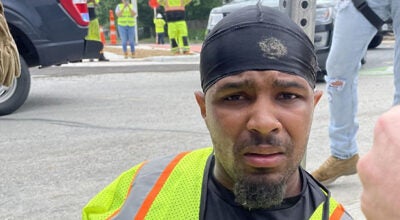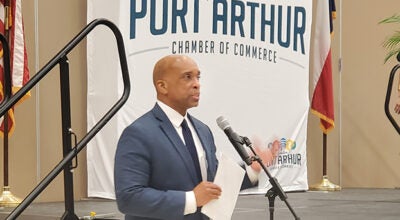Know the common signs of contractor fraud
Published 8:15 am Monday, September 23, 2019

- It’s not unusual for a contractor to request some money upfront, but don’t put a substantial portion of the job down right away.
The Jefferson County Sheriff’s Office is warning residents impacted by recent storm damage to be aware of contractor fraud, including ways to avoid getting scammed. Advance Full Payment … If a contractor requires the full payment upfront, you definitely should think twice about doing business with them.
What to do: It’s not unusual for a contractor to request some money upfront, but don’t put a substantial portion of the job down right away. Other payments should be made according to an agreed upon schedule as certain work is finished.
Never pay in full or sign a completion certificate before the work is done to your satisfaction and you’ve confirmed it’s code-compliant. If you pay them in full while there are still expectations to be met, many contractors will have little incentive to come back and resolve any issues.
Contractors Who Don’t Pay the Supplier…So, you paid your contractor for the completed work but you find out they didn’t pay the supplier for the materials. Now, the supplier comes after you for the cost of the materials that the contractor should have paid for!
What to do… Before work begins, consider seeking a lien waiver from the contractor. That way, when the project is complete, both you and the contractor will sign off and state all the contract obligations have been met. This includes the contractor making all the payments to the suppliers.
If the contractor doesn’t sign off on the lien waiver, you don’t have to pay them until they’ve proven their suppliers have been paid.
Full Credit For Your Deductible…. Sometimes you just have to know when something is too good to be true.
What to do: Getting full credit for your deductible sounds great, right? There are many contractors who actually tempt you with this offer to get you to sign with them, but, keep in mind this could be illegal and probably a sign that the contractor is not on the up and up.
Free Inspections… Most legitimate contractors offer no charge for an estimate, but as always, be wary.
What to do…During the inspection, be extra attentive to their assessment. And it’s always a good idea to get more than one estimate. Some contractors will even go so far as to target the elderly and perform inspections in places of their homes where they can’t easily access, like crawl spaces.
This is an easy way for a contractor to get away with fraud and taking someone’s money.
Out-of-State Contractors… There are contractors out there who follow storm events from state to state, looking for easy targets. Hiring an out-of-state contractor can be problematic for a couple of reasons:
First, if they did careless work or didn’t complete the job at all, but still took your money, they’ll be difficult to track down.
Second, even if it’s a legitimate company, if an issue pops up later, you might have a difficult time getting them to come make corrections to the work.
What to do… Go with a local contractor with a known track record to avoid these “storm chasers”. You can check with the Better Business Bureau or ask within the community for references and recommendations. The local phone number is 409-835-5348.
Poor Workmanship… Some contractors will use cheap materials and hire inexperienced workers in order to make a bigger profit. They might even cause damage to your roof or siding and indicate it was caused by the storm.
What to do: The best thing you can do to avoid scenarios like these is to obtain references and be diligent about researching a reputable contractor.
Feel free to ask the contractor for references from past jobs, how long they’ve been in business and try to be knowledgeable about some of the materials they’re working with. Don’t allow them to inspect your roof or other property until you feel comfortable they’re a trustworthy contractor.
Unforeseen Problems… If a contractor reveals an unforeseen problem, be guarded. What to do…Get a second opinion.
If a contractor points out a problem that you didn’t hire them to fix, be sure to get either another person to take a second look or do some research and make sure the problem needs immediate attention. Both you and the contractor should sign a contract before they begin work on it or charge you any amount.
Improper Permits… A building permit ensures that your property was reviewed and inspected to meet codes, ordinances and requirements. If a contractor fails to get the correct permit, there may be risks involved.
What to do… When you ensure that your contractor gets a building permit, you’re ensuring their work is inspected and up to local code.
If they don’t have a proper permit, you could be liable for any problems or injuries sustained during the project. Also, if the contractor installs anything improperly and it later needs to be fixed, your insurance is likely not going to cover any expenses.
Proper Licensing… If your contractor doesn’t have a proper license that meets your state’s requirements, you could be held responsible if issues arise during the project.
What to do… Ask for the contractor’s license (a business license is not the same as a contractor’s license), which you can look up on your city or state’s government website.
Remember, if you decide to work with a contractor who isn’t licensed, perhaps because they offer cheap services, you could be responsible for any problems that arise. For example, you could be financially responsible if the contractor or subcontractors cause any damage to your property, or if a worker is injured on your property. You could also be liable if your project doesn’t meet local building codes.
Contract Agreements…Think twice about a contractor who isn’t willing to put terms into writing.
What to do… Always require a written contract that has everything you want and agree to. You and your contractor should sign a final contract that is read by both parties.
Soliciting… Contractor fraud is especially prevalent after storms, and some contractors will even initiate contact with homeowners long after the storm happened. They may use advertisements like flyers and door hangers to solicit the claim.
What to do.. There are some contractors who use this form of advertising and timeliness as an honest, advantageous search for work, but, again, be guarded and ask questions. It’s good practice to contact your insurance agent — or claims adjuster if the claim has been submitted — prior to agreeing to work with any contractor.
We Also Suggest…Take a photo of your contractor, their driver’s license, their work vehicles and their license plates. This way, if you do get scammed and work to file criminal charges, your suspect will be clearly identified.





